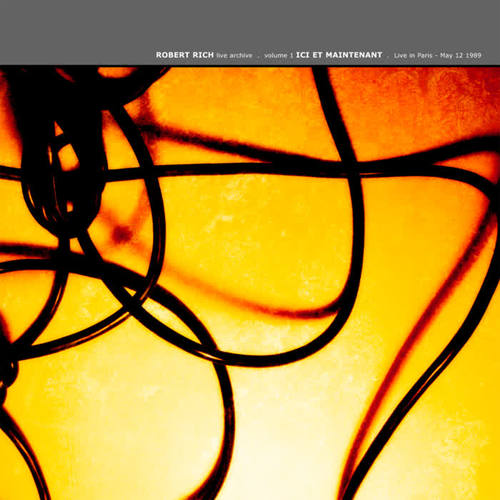
Ici et Maintenant: Live in Paris, May 12 1989
Soundscape SP014
©1989 by Robert Rich, BMI
Recorded at Radio Ici et Maintenant
Thanks to Serge LeRoy and Bruno Heuzé for their assistance, and to Dixie.
Robert Rich played Ensoniq EPS, Yamaha DX7II, loops and effects, flutes, ambience recordings.
Notes:
I tried to make the most out of very little during my 1989 European tour. This was my first chance to perform outside of North America, and few people knew my music. I had self-released my first three albums from 1981-1983. In 1984 Hans Fahlberg offered to release some of my music on his new label based in Sweden. At the time I only had some obscure live recordings to share. These became his first release: Robert Rich Live. In 1985 Hans asked me to record an LP inaugurating his renamed Multimood label. It became the Swedish vinyl release Numena. A few years later, Numena got noticed a bit in London's early rave circles, while Serge LeRoy in Paris licensed it for CD in France.
These two early supporters of my music, Hans Fahlberg and Serge LeRoy, offered to get gigs for me in Europe in 1989. My wife Dixie (my girlfriend back then) found some very cheap airfare. I worked out a way to perform with minimal equipment. This was long before the days of laptops. "Minimal" still meant four flight cases, which we dragged around Europe onto trains and boats, stacked on wheels and pulled by rope like a stubborn mule. Each synth only did one or two things at a time, so it took a lot of gear to make a live electronic concert.
After a successful performance in Göteberg, Sweden, Dixie and I met up with Serge LeRoy in Hamburg, Germany, and we traveled together to Berlin. This took place six months before the Berlin wall came down. We passed through East German crossing gates with eye-glasses off, showing our passports to guards carrying submachine guns. Nobody could have guessed such big changes were coming, with the breakup of the Soviet Union. East Berlin hung like a gray pallor across an impenetrable barrier of history. We spent a day touring the city with Conrad Schnitzler as our guide, a generous black leather teddy bear full of friendly energy and vivid stories of the German underground art scene, and a few harrowing stories of growing up during WWII. We had an Italian dinner with Andreas Grosser, who had been stranded in West Berlin after escaping the East. An East German guard boat pointed guns at us while we looked at graves of failed escapee swimmers behind the Reichstadt, pocked with bullet holes, on the slopes of the river. We had coffee with drummer Klaus Kreuger after visiting Tangerine Dream's studio, in an old bank building with white faux fur tapestries on the wall for acoustic treatment.
When we returned to Hamburg after our whirlwind two-day visit to Berlin, we couldn't find a place to stay; so we decided to keep driving south to Paris. That was long after midnight. Serge started driving south on the autobahn, but began falling asleep at the wheel, so I took over driving around 3 am. I remember how it felt to navigate between the zooming Mercedes in the left lane and the heavily laden farm trucks in the right. We were driving a wimpy Opel wagon in the rain with my gear strapped to the roof, only slightly faster than the hay trucks crawling on the right. Mid-morning after a glorious sunrise, we arrived in Paris. I woke Serge to ask how to navigate those crazy roundabouts. He guided us to our hotel, and to the radio station to deposit the gear. We slept for a few hours mid-day, curtains closed against the sun. During the concert, Serge was so tired that he fell asleep during my second set, after translating our live interview. Listeners called in with questions, which I tried to answer in my very poor French.
On the 20th anniversary of this radio concert in Paris, I can distance myself to reflect a bit on my attempts at expressing the ineffable with limited skills, limited gear, sleep deprived, functioning on adrenaline. I hear it as a bit of historical anomaly. I can hear those moments that transcend the tools and circumstance, but remain framed within the context of a concert built from necessity. When I try to separate myself from memories of making this music, I realize that much of the second set, and moments of the first, retain some timeless qualities that I still crave. The remainder may only be interesting historically. I hope that listeners might feel some energy from the moments of discovery hidden in this archive, dated though it may sound at times.
